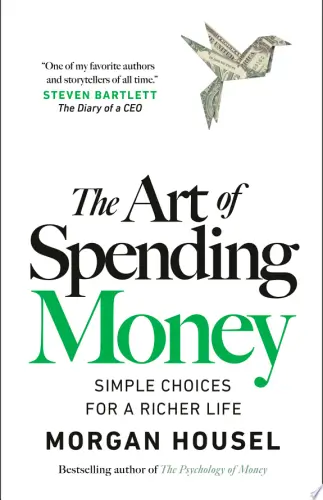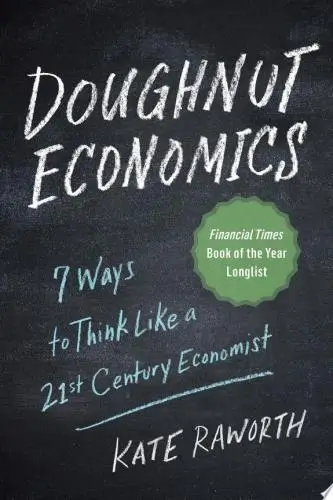Freakonomics
A Rogue Economist Explores the Hidden Side of Everything
What's it about?
Freakonomics explores the hidden side of everything, challenging conventional wisdom through data-driven insights. It delves into unexpected correlations, such as the link between abortion rates and crime reduction, and examines the economics of drug dealing and the impact of a name on a person's life. The book uses economics as a tool to reveal the unseen truths behind daily phenomena, encouraging readers to think critically about the world around them.
About the Author
Steven D. Levitt is an economist known for his unconventional approach to analyzing everyday phenomena in his book "Freakonomics." His writing style is engaging, blending economics with real-world examples to uncover surprising insights. Levitt's work challenges conventional wisdom and explores the hidden motivations behind human behavior, making complex ideas accessible to a wide audience. Through his unique perspective, he offers readers a fresh take on the world around them.
10 Key Ideas of Freakonomics
Uncover Hidden Incentives to Predict Behavior
Understanding the underlying incentives that drive people's actions is crucial.
People respond to incentives, whether they are financial, social, or moral.
By identifying these hidden motivators, one can predict how individuals and groups might behave in certain situations.
This approach requires looking beyond the obvious to uncover less apparent reasons behind actions, leading to more accurate predictions and effective solutions.
Learn DeeperObserve and Question: Start by observing the actions and decisions of those around you. Ask yourself what incentives might be driving this behavior. Is it financial gain, social approval, or perhaps avoiding a penalty?
Identify Your Own Incentives: Reflect on your own decisions and behaviors. What are the underlying incentives for you? Understanding your own motivators can help you make better choices and understand others' actions.
Experiment with Incentives: If you're in a position to influence behavior (as a parent, manager, or leader), experiment with different incentives to see how they change outcomes. This could be as simple as offering praise for desired behaviors, or more complex like restructuring rewards systems.
Apply to Problem-Solving: When faced with a problem, think about the incentives that are currently in place. How might they be contributing to the issue? Consider how altering or introducing new incentives could lead to a solution.
- Example
A company struggling with low employee morale introduces a 'Employee of the Month' program, offering a mix of social recognition and a financial bonus. Observing the changes in employee behavior following this can provide insights into what motivates the team.
- Example
A parent wants to encourage their child to read more. Instead of mandating a reading time, they introduce a system where the child earns points for every book read, which can be exchanged for a reward. This shifts the child's incentive from avoiding a disliked task to engaging in it for a desired outcome.
Utilize Information Asymmetry to Your Advantage
Information asymmetry occurs when one party in a transaction has more or better information than the other.
Recognizing and leveraging this can provide a significant advantage.
For instance, in a market where sellers know more about the product quality than buyers, sellers can exploit this knowledge.
Conversely, buyers can seek ways to reduce this gap through research or third-party inspections, leveling the playing field.
Learn DeeperResearch Before You Buy: Before making any significant purchase, spend time researching the product or service. Look for reviews, compare prices, and check the specifications. This reduces the information asymmetry between you and the seller.
Ask Questions: Don't hesitate to ask sellers detailed questions about the product or service. Their answers can provide insights that aren't available through standard descriptions or reviews.
Use Third-Party Inspections: When buying something like a used car or a house, hiring a third-party inspector can level the playing field. They can uncover issues that the seller may not disclose, giving you a clearer picture of what you're buying.
Educate Yourself: Continuously seek to improve your knowledge about markets you frequently engage in. Whether it's real estate, automobiles, or technology, being more informed than the average buyer can give you an edge.
Negotiate with Confidence: Use the information you've gathered to negotiate better terms. Sellers are more likely to offer concessions if they realize you're well-informed.
- Example
When buying a used car, instead of taking the seller's word for its condition, you hire a mechanic to inspect the vehicle. The mechanic finds issues that the seller didn't disclose, allowing you to negotiate a lower price or decide not to buy.
- Example
Before purchasing a new laptop, you spend a few hours researching the models that fit your needs, reading professional reviews, and checking user feedback on various forums. Armed with this information, you're able to choose the best option for your budget and negotiate a better deal, knowing the average prices and common issues.
Question Conventional Wisdom
Conventional wisdom often goes unchallenged, yet it may be misleading or incorrect.
By critically examining commonly accepted truths and testing them against data, new insights can emerge.
This approach encourages skepticism and curiosity, driving deeper analysis and uncovering truths that challenge mainstream beliefs.
Ultimately, this can lead to innovative solutions and perspectives.
Learn DeeperQuestion Your Assumptions: Before accepting a piece of information as truth, take a moment to consider where it comes from and why it's considered true. Is it based on data, or is it a widely held belief that hasn't been challenged?
Seek Out Data: Whenever possible, look for data to support or refute the conventional wisdom you encounter. This could involve doing your own research, reading studies, or even conducting simple experiments if applicable.
Engage in Healthy Skepticism: Don't immediately reject conventional wisdom, but maintain a healthy level of skepticism about it. Ask questions like 'Why?' and 'How do we know this?' to dig deeper into the origins and validity of these beliefs.
Share Your Findings: If you discover that a piece of conventional wisdom doesn't hold up under scrutiny, share your findings with others. This can be through conversation, social media, blogging, or any platform where ideas are exchanged. It's important to contribute to a culture where questioning and verifying information is valued.
- Example
A common piece of conventional wisdom is that eating late at night leads to weight gain. To challenge this, one might look into recent scientific studies on the topic to see if data supports this claim. Upon investigation, they might find that total caloric intake throughout the day is more significant than meal timing, challenging the initial belief.
- Example
Another example is the belief that small class sizes improve student learning outcomes. By examining educational research and data, one might discover that while class size can have an impact, factors such as teaching quality and student engagement are more critical determinants of student success, prompting a reevaluation of where educational resources are best allocated.
Embrace the Power of Experimentation
Experimentation allows for the testing of hypotheses in controlled settings, providing clear evidence of cause and effect.
By systematically varying conditions and observing outcomes, it's possible to discern the impact of specific variables.
This method is invaluable in fields ranging from economics to social policy, offering a robust way to evaluate the effectiveness of different approaches.
Learn DeeperStart Small: Begin by applying the principle of experimentation to minor decisions or changes in your life. For instance, if you're trying to improve your productivity, experiment with different work techniques for a week at a time and note the results.
Keep a Record: Document your hypotheses, the conditions you're testing, and the outcomes. This could be as simple as keeping a journal or spreadsheet. Tracking results over time will help you identify what works best for you.
Control Variables: When experimenting, change only one variable at a time. This helps ensure that the results you observe are actually due to the change you made, not some other factor.
Seek Feedback: Share your experiments and findings with friends or colleagues. They might offer insights you hadn't considered or suggest new variables to test.
Apply It Broadly: Don't limit experimentation to personal productivity or habits. Use it to make informed decisions about investments, health, education, and even relationships. Testing and learning can apply to almost every aspect of life.
- Example
If you're experimenting with improving your sleep quality, you might decide to test the hypothesis that 'drinking a cup of chamomile tea before bed improves sleep quality.' For one week, drink the tea before bed and track your sleep quality using a journal or app. The following week, don't drink the tea and compare the results.
- Example
Consider a small business owner looking to increase foot traffic. They could hypothesize that 'offering a small discount on certain days will increase customer visits.' To test this, they could offer a 10% discount on Tuesdays for a month, tracking daily foot traffic and comparing it to data from the previous month without discounts.
Understand the Impact of Social Norms on Economic Behavior
Social norms and cultural practices significantly influence economic decisions.
These unwritten rules of behavior within a group or society can dictate choices in ways that might seem irrational from a purely economic standpoint.
Recognizing the role of social norms can explain seemingly inexplicable behaviors and offer strategies for influencing decisions, from consumer purchases to investment strategies.
Learn DeeperObserve and Reflect: Start by paying attention to the social norms within your community or industry. Notice how these unwritten rules influence your own decisions and those around you. Reflect on whether these influences are beneficial or detrimental to your economic goals.
Question the Status Quo: Don't be afraid to question why certain norms exist and whether they still serve a valuable purpose. This critical thinking can lead to more informed and potentially innovative economic decisions.
Experiment with Change: Try making small changes in your behavior that go against the grain of social norms, but could lead to better economic outcomes for you. Monitor the results closely and adjust your approach as needed.
Educate and Influence Others: Share your findings and thoughts about the impact of social norms on economic behavior with your peers. By initiating discussions, you can help others become more aware of their own decision-making processes and potentially influence change on a larger scale.
Leverage Social Norms for Positive Outcomes: If you're in a position to do so, consider how you can use social norms to positively influence economic behaviors. For example, if you run a business, think about how you can align your marketing strategies with the prevailing norms to drive consumer behavior.
- Example
A local business owner notices that people in their community highly value sustainability but often buy products that are not environmentally friendly due to lack of awareness. The owner decides to stock more eco-friendly products and highlights their benefits in the store's marketing materials, tapping into the community's social norm of valuing sustainability to influence purchasing decisions.
- Example
An individual realizes that in their social circle, there's a norm of always opting for brand-name products, assuming they are of higher quality. To challenge this norm, the person starts sharing their positive experiences with high-quality, lesser-known brands on social media, providing detailed comparisons and encouraging friends to try these alternatives. This initiates conversations about value for money and slowly influences the group's purchasing habits.
Deeper knowledge. Personal growth. Unlocked.
Unlock this book's key ideas and 15M+ more. Learn with quick, impactful summaries.
Read Full SummarySign up and read for free!
Freakonomics Summary: Common Questions
Experience Personalized Book Summaries, Today!
Discover a new way to gain knowledge, and save time.
Sign up for our 7-day trial now.
No Credit Card Needed

Similar Books

Forex Trading QuickStart Guide
Troy Noonan
The Art of Spending Money
Morgan Housel
Trading in the Zone
Mark Douglas
Doughnut Economics
Kate Raworth
A study guide for Barbara Ehrenreich's "Nickel and Dimed: On (Not) Getting By in America"
Gale, Cengage Learning
Bitcoin For Dummies
Prypto
Debt
David Graeber
The Barefoot Investor
Scott Pape
Money Has No Value
Samuel A. Chambers
Financial Peace
Dave RamseyTrending Summaries

Peak
Anders Ericsson
Never Split the Difference
Chris Voss
Smart Brevity
Jim VandeHei
The Psychology of Money
Morgan Housel
The First 90 Days
Michael D. Watkins
Atomic Habits
James Clear
Thinking, Fast and Slow
Daniel Kahneman
The Body Keeps the Score
Bessel van der Kolk M.D.
The Power of Regret
Daniel H. Pink
The Compound Effect
Darren HardyNew Books

Forex Trading QuickStart Guide
Troy Noonan
Comprehensive Casebook of Cognitive Therapy
Frank M. Dattilio
The White Night of St. Petersburg
Michel (Prince of Greece)
Demystifying Climate Models
Andrew Gettelman
The Hobbit
J.R.R. Tolkien
The Decision Book
Mikael Krogerus
The Decision Book: 50 Models for Strategic Thinking
Mikael Krogerus
Fichte
Johann Gottlieb Fichte
Do No Harm
Henry Marsh

